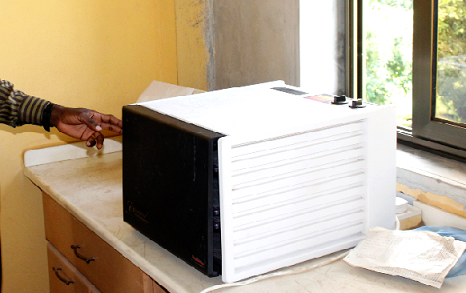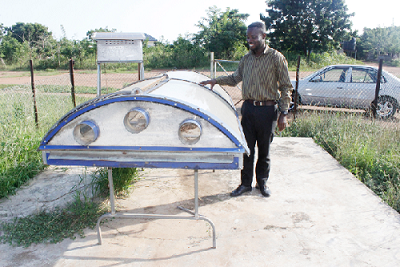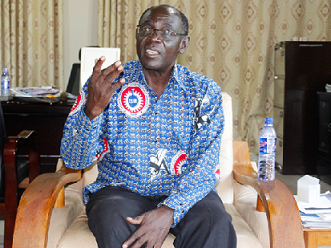
Innovation for industrialisation - CSIR shows the way
The Council for Scientific and Industrial Research (CSIR), is developing products and services critical to jump-starting Ghana's industrialisation.
Advertisement
According to its management, the council now strategically positioned to team up with industrialists or businesses to produce the items commercially.
The effort has come with so much sacrifice on the part of scientists who have had to improvise with equipment to get
Tackling glut
The Director of the CSIR Animal Research Institute, Professor Emmanuel K. Adu, told the Daily Graphic that a glut in egg production that sometimes led to farmers destroying their produce impassioned him on the course of getting the technology for the production of the products.
Ghana produces 1.5 million eggs daily and according to the Ghana National Association of Poultry Farmers, in peak production periods, the country faces a glut on the market with some going bad.
Farmers then have to destroy up to 10 per cent of what they produce annually, according to the association.

Mr Ansong explaining how the solar dryer works
Know-how
Thus, Prof. Adu got to work with his scientists to apply already-existing knowledge in the production of egg powder, egg oil and albumen, suited to local needs but viable internationally.
The innovation by the CSIR will ensure that Ghanaians have eggs, which have quality protein, throughout the year, in the form of powder which can be used in confectionery and pastries, egg oil used in cosmetic and pharmaceutical products and powdered albumen, which is the raw material for manufacturing surgical adhesives and, which is currently the preferred suturing material for certain delicate tissues like the
“Now the know-how is with us,” Prof. Adu said.
Partnerships/vision
According to the CSIR, producing the product in
“Mind you, this is not a totally new idea.
“We localised an
Having taken the decision, the CSIR’s next hurdle was finding the right production equipment.
“We put our heads together and realised that the equipment could not be easily obtained locally. We, therefore, had to improvise. I had a machine and we brought it in, unfortunately, it was subject to frequent breakdowns,” Prof. Adu recounted.
“We realised it was not only the powder, but we could generate oil from the egg and we also discovered that we could separate the albumen from the yolk,” he added.
He said the discoveries were in sync with his vision of making the CSIR Animal Research Institute relevant by developing usable products for the public when he became the director.
“So that is the task we have set ourselves. We think that we have to drive industry, we have to be able to create industries by these innovations. We needed to put out
“Other ideas we have is the production of collagen used in cosmetic surgical treatment from pig skin and from ‘welle’. We are also looking at producing gelatin used in pharmaceuticals,” he said.

Prof. Adu, Director of the Animal Research Institute of the CSIR making a point
Resourcing scientists
For Prof. Adu, the work of the scientists was to innovate for industries and commercial concerns.
He said the CSIR was open for private partnerships for the commercial production of the items.
Currently, the institute has a Memorandum of Understanding (MoU) with a feed manufacturer to produce black soldier fly larvae for feed production, thereby cutting down on feed costs per tonne and with animals performing better on that than other animal protein.
Prof. Adu said he was not in support of the idea of research institutions becoming commercial entities, that is generating 30 per cent of their revenue or funding.
That policy worked well in jurisdictions with vibrant industries that could be resorted to for funding when there were challenges.
“The government must rethink this policy, by this policy it is wasting talent when it does not support scientists to
Prof. Adu was of the view that prioritising was the key in the use of scarce resources and in funding research institutions.
Sights of CSIR
Touring the Animal Research Institute with a Principal Technologist, Mr Thomas Agyei Ansong, the Daily Graphic got to see the improvised machine used for the technique of
Mr Ansong said their products were comparable to any internationally, with a shelf life of up to 10 years for the egg albumen.
The improvised dehydrator, originally for drying fruits and nuts on a small scale, had broken down, requiring the institute to acquire a proper one now.
An innovative solar dryer designed by the institute traps sunlight in an enclosure to dry meat, herbal medicine, fish and other food products requiring a solar-drying procedure.
Another innovation is the spraying of sawdust with Indigenous Micro-Organisms (IMO) in pigsties, which apart from acting as an absorbent for their waste, sufficiently breaks down the sawdust for the pigs to also feed on, halting the cost of feeding and with good results.
Interestingly, it acted in a manner that no smell emanated from the pigsties.



